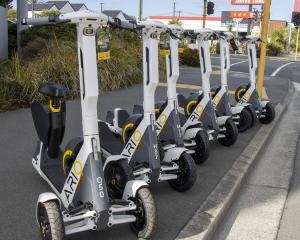However, reservations have resurfaced about a comparative lack of government support for Otago facilities.
The Christchurch City Council yesterday voted to sign a $683 million fixed-price contract to build Te Kaha, a multi-use arena.
That came after a budget blowout of $150 million.
Dunedin Mayor Aaron Hawkins said it would be at least four years before the new Christchurch stadium opened and he was confident Dunedin Venues Management Ltd would set up Forsyth Barr Stadium to remain competitive in the new environment.
Mr Hawkins said the stadium debate in Christchurch felt familiar.
"There’s something about facilities like this that makes them immune to the same level of rigorous consideration applied to other capital projects," he said.
"I can only imagine how different a debate about cycling projects blowing out by $150 million would be."

Business South chief executive Mike Collins said Dunedin’s example had shown benefits for Christchurch from a covered stadium would be significant.
"I don’t see it diminishing what we’ve got here," Mr Collins said.
"I’m pretty sure Forsyth Barr Stadium will continue to attract and host events alongside the Canterbury stadium."
The Government is chipping in $220 million for the Christchurch stadium.
Forsyth Barr Stadium was completed in 2011 and the then government contributed $15 million to the $266.4 million build.
Dunedin city councillors Lee Vandervis and Carmen Houlahan drew attention to the amount of government backing for the Christchurch project.
Cr Houlahan said doubling up on covered stadiums in the South Island seemed to be at odds with the Government’s centralisation reform drive in fields such as Three Waters.
Cr Jules Radich said Christchurch did not want to be outshone by Dunedin.
"Naturally, they’re looking after themselves," he said.
Dunedin might need to work harder to get its share of sports fixtures and concerts, he said.
Dunedin mayoral hopeful Bill Acklin said the planned Christchurch stadium should not be perceived as a threat.
"When you look at the success of ours, why wouldn’t they want one?"
Dunedin Venues Management Ltd chief executive Terry Davies said the new Christchurch stadium would be "just another player in the market".
"Competitors are out there everywhere," Mr Davies said.
Dunedin Venues would "just get on with business".
Highlanders chief executive Roger Clark said the Super rugby side would enjoy playing at another top-notch venue.
"For the people of Canterbury, it’s awesome," Mr Clark said.
Malcolm Farry, who has been described as the driving force behind getting Forsyth Barr Stadium built, said the Christchurch debate brought back memories.
Mr Farry said that when the feasibility of Dunedin’s stadium was being examined the likelihood of another covered stadium being built in the South Island was looked into.
"The answer was ‘no’, but then the earthquakes happened in Christchurch and things changed," Mr Farry said.
"We have to accept Christchurch needs a stadium, and a good one.
"They’re paying a big bill for it."
Mr Farry said Dunedin had established a successful operation and he expected it to remain competitive.
"We’ll be up for the challenge." — Additional reporting by Wyatt Ryder













